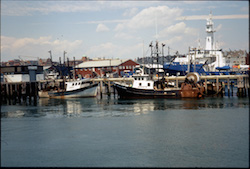Not for the first time, scientists and fishermen are at odds in New England, not for the first time on the subject of Gulf of Maine cod.
So far this year, cod landings at the Portland Fish Exchange are up by a factor of nearly two over 2013. NMFS contends stocks are down significantly from just a year ago.
Yet not only are the fishermen catching more cod, they are doing so with less effort – 93 fewer trips so far this year, according to the Portland (Maine) Press Herald.
Scientists say that fish tend to hyper-aggregate when stocks are depleted, and that when fishermen locate them their landings suggest much more widespread abundance than is the case.
In other words, fishermen cannot win. If landings are low, they’re told stocks are depleted, and if they improve, they’re told the outlook is even grimmer.
Granted, we’re not talking about a tremendous amount of fish: 153,000 pounds have come across the floor at the Portland Fish Exchange since May 1 vs. 85,000 during the same period last year.
Not a lot of fish, but enough to suggest that further reducing landings may serve neither fish nor fishermen.
The reality is that only the fish know whether they’re recovering or hyper-aggregating. We need to stop this business of turning to old models to explain new data. When landings run contrary to models, the answer has to be new research, not old explanations.







